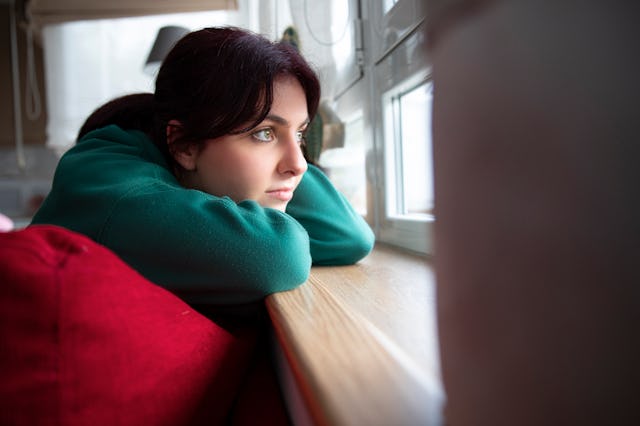The Signs Of Depression In Teens Can Be Different Than In Adults
A doctor from the Mayo Clinic breaks down the most common signs of depression in teens.

Last month, the CDC issued a warning that teen mental health in the United States has reached crisis level, thanks to the pandemic and all of the related issues that came with it. Across the country, isolation, worry, disruption, and insecurity mean that teens are suffering from depression, anxiety, and eating disorders at escalating rates, with 37 percent of kids reporting to the CDC that they’re struggling.
While the good news is that adolescent depression is very treatable, the bad news is that many parents don’t realize that the signs of symptoms of depression in kids can be very different from the signs and symptoms in adults.
This month, the Mayo Clinic released a short video outlining how depression can present differently in teens — as well as the top signs and symptoms that you should be on the lookout for if you’ve got tweens and teens in your house.
“It’s a very real diagnosis, and it’s different in adults and kids,” Dr. Marcie Billings, a Mayo Clinic pediatrician, says in the video.
In an adult, feelings of sadness, emptiness, or hopelessness are the biggest red flags for depression. But in kids, look out for slightly different warning signs in addition to simple sadness.
“In a child or adolescent, you might see more irritability, cranky behavior, isolative behavior,” Dr. Billings says.
In kids and teens, of course, things like outbursts, isolation, and irritability can be very commonplace features of growing up, as most parents know. In the case of depression, look for changes in behavior over all else.
“They used to want to hang out with friends — now they’re not. Grades are suffering. They’re struggling to get done what they normally do every day. They’re tired all the time. They can have sleep problems. They can have eating problems,” Dr. Billings says.
Weight loss or weight gain are two signs of depression in adults. But when you’re concerned about your teen’s mental health, look for weight changes that are worrying in context with their growing bodies.
“You might see that they’re not gaining weight appropriately,” Dr. Billings explains.
In teens, depression is also strongly linked with what is going on in their lives (like the pandemic), so look out for issues like bullying, peer pressure, or pressure to perform academically in combination with the signs listed above.
What should you do if you think your teen might be suffering? Get their pediatrician or your family doctor on the line as soon as possible and make an appointment.
If you or someone you know is seeking help for mental health concerns, visit the National Alliance on Mental Illness (NAMI) website, or call 1-800-950-NAMI (6264). For confidential treatment referrals, visit the Substance Abuse and Mental Health Services Administration (SAMHSA) website, or call the National Helpline at 1-800-662-HELP (4357). In an emergency, contact the National Suicide Prevention Lifeline at 1-800-273-TALK (8255) or call 911.
This article was originally published on